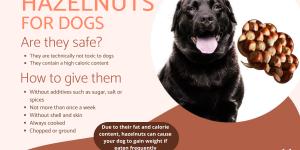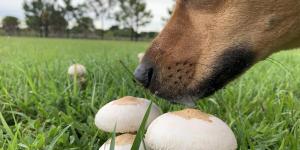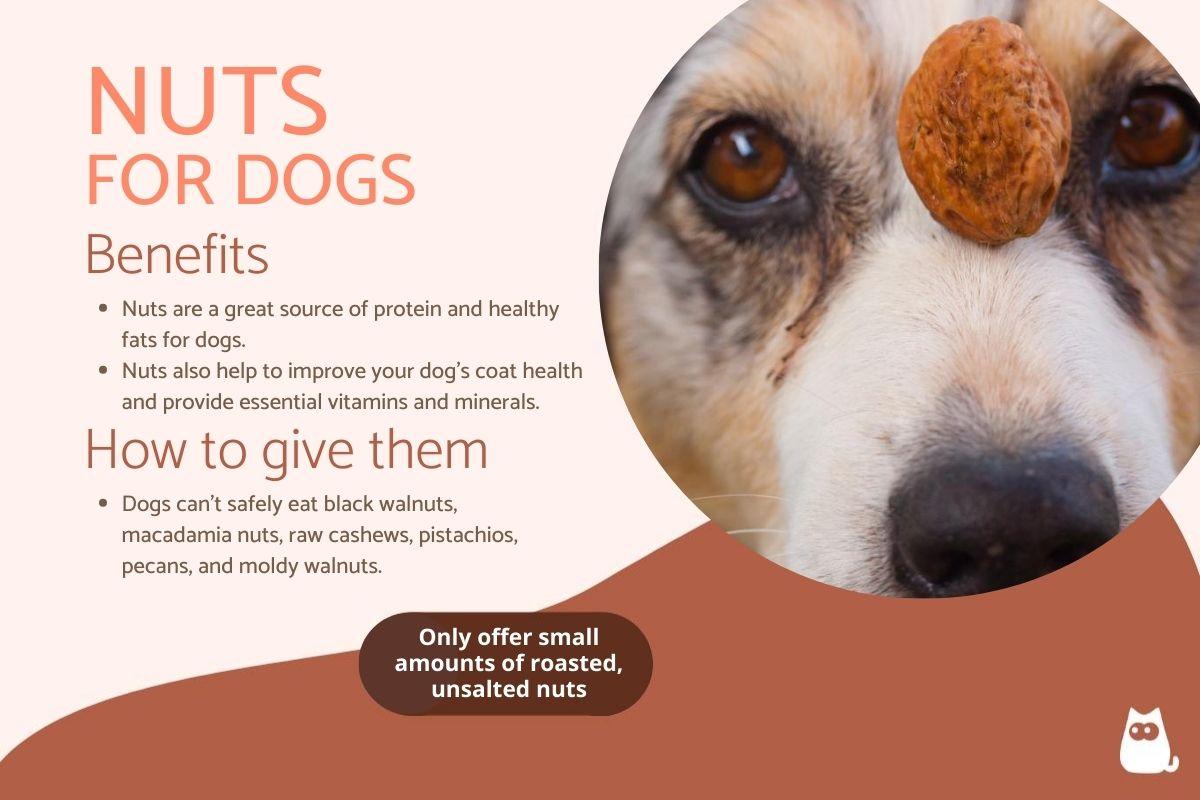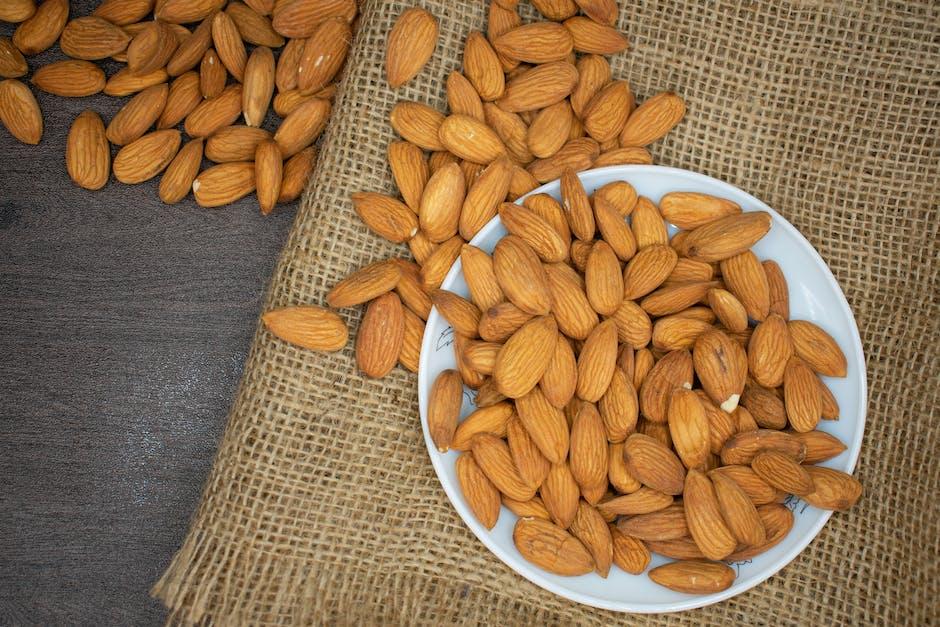Can Dogs Eat Nuts Safely?

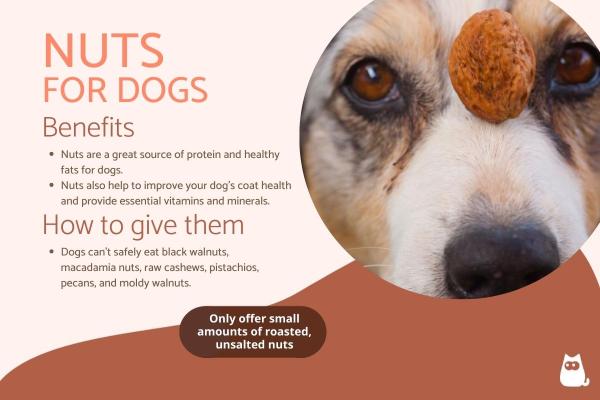

See files for Dogs
Nuts are a popular snack for humans, but many dog owners wonder if their furry companions can safely enjoy these crunchy treats. While some nuts are perfectly safe for dogs to consume, others pose potential risks that should be carefully considered. Understanding the potential benefits and drawbacks of feeding nuts to dogs is crucial for responsible pet care.
The following article explores the safety of dogs consuming nuts, delving into both beneficial and harmful varieties. We also explore the potential benefits and side effects associated with nut consumption for dogs.
Can dogs eat nuts?
The question of whether dogs can safely consume nuts remains a topic of debate among pet owners and veterinarians. While some nuts are generally considered safe for dogs in small quantities, others pose potential risks that should be carefully considered.
With careful selection and moderation, certain nuts can be safely incorporated into your dog's diet. Here's a guide to common nuts and their suitability for canine consumption:
- Peanuts: peanuts are generally safe for dogs in moderation. However, they should be unsalted and unflavored.
- Almonds: while almonds are a good source of protein and healthy fats, they should be given in moderation due to their high content of arginine.
- Sunflower seeds: sunflower seeds, without the shell, are a healthy option for dogs. They are a good source of protein, healthy fats, and vitamins.
- Cashews: cashews can be a healthy treat for dogs in small quantities. They are a good source of protein and healthy fats.
- Hazelnuts: hazelnuts are safe for dogs in moderation. They are a good source of protein and healthy fats.
- Walnuts: walnuts, such as English walnuts and black walnuts, are generally safe for dogs in moderation. However, avoid feeding macadamia nuts to dogs, as they can be toxic.
While you're here, delve into the intricacies of canine nut consumption in our article on the safety of cashews for dogs.
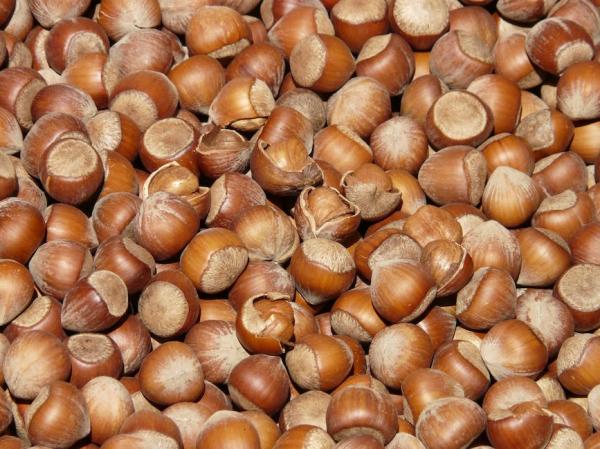
Which nuts are toxic to dogs?
While certain nuts offer safe and healthy options for dogs, there are also a few varieties that pose potential risks and should be avoided. Understanding these hazards is essential for responsible pet care. Let us take a closer look at each case:
Macadamia
Macadamia nuts are a notorious threat to canine health. Consuming even a small amount of these nuts can lead to a range of symptoms, including:
- Muscle tremors and weakness
- High fever
- Vomiting and diarrhea
- Stiffness and lameness
Macadamia nut poisoning can be severe and require veterinary attention. If you suspect your dog has ingested Macadamia nuts, seek immediate veterinary care.
Hazelnuts
Hazelnuts, while generally safe in moderation, can cause gastrointestinal upset in some dogs. Their high fat content can also contribute to weight gain if consumed regularly. Additionally, hazelnuts can pose choking hazards due to their small size.
Brazil nuts
Brazil nuts are a good source of selenium, an essential mineral for dogs. However, excessive amounts of selenium can lead to selenium toxicosis, a serious condition characterized by vomiting, diarrhea, lethargy, and organ damage.
To avoid selenium poisoning, limit the consumption of Brazil nuts to no more than one or two per week. Additionally, choose raw or roasted Brazil nuts over salted or chocolate-covered varieties.
Pine nuts
Pine nuts, when consumed in moderation, are generally safe for dogs. However, they can be a choking hazard due to their small size and hard shell. Additionally, pine nuts can cause digestive upset in some dogs.
Chestnuts
Chestnuts are often associated with holiday traditions, and it's natural to wonder if dogs can safely enjoy these roasted treats. However, chestnuts pose potential choking hazards due to their hard shell. Additionally, they can cause digestive upset in some dogs.
Keep your canine companion safe and informed by reading our comprehensive guide on foreign objects in the throat, a potential life-threatening situation.
Benefits of nuts for dogs
Nuts, when incorporated responsibly into a dog's diet, offer a range of potential health benefits. Various nuts, such as almonds, walnuts, and cashews, are packed with essential nutrients that can contribute to a dog's overall health. These nuts provide a rich source of:
- Protein: essential for building and repairing tissues, muscle growth, and maintaining a healthy immune system.
- Fats: provide energy, support cell growth, and aid in nutrient absorption.
- Fiber: promotes healthy digestion and gut bacteria balance.
- Vitamins and minerals: including Vitamin E, a powerful antioxidant, and magnesium, which helps regulate muscle and nerve function.
Furthermore, certain nuts, such as walnuts, are rich in omega-3 fatty acids, which are crucial for maintaining a healthy coat and skin. Omega-3s nourish the skin, reduce inflammation, and promote skin cell regeneration. This can lead to a shinier, smoother coat, and reduced skin allergies or irritations.
Finally, nuts contain antioxidants, such as vitamin E and certain phytochemicals, which help neutralize free radicals, harmful molecules that contribute to aging and chronic diseases. Additionally, some nuts, such as almonds, have been associated with potential anti-inflammatory properties, which can help reduce inflammation associated with joint pain and other health conditions.

How to give nuts to dogs
When preparing nuts for your dog, it's essential to follow safe and appropriate methods to ensure their well-being. Here are some key considerations:
- Remove shells: shells pose a choking hazard, so carefully remove them before feeding nuts to your dog. This is particularly important for small breed dogs and those with brachycephalic snouts.
- Avoid salt: salt is a major concern for dogs, as excessive consumption can lead to dehydration and sodium poisoning. Choose unsalted nuts to prevent this issue.
- Roast or raw: while raw nuts offer some nutritional benefits, roasting them can enhance their palatability and make them easier for dogs to digest. However, ensure the nuts are fully roasted and cooled down before feeding them to your dog.
- Chop or grind: large pieces of nuts can pose a choking hazard, especially for smaller dogs. Chopping or grinding nuts into smaller pieces can improve their digestibility and reduce the risk of choking.
Determine if your dog's diet is causing discomfort by exploring our informative article on dog food allergies.

Dosage of nuts for dogs
The ideal dosage of nuts for dogs depends on the size and breed of the dog. Here is a table of the recommended dosage of nuts for different dog breeds:
- Toy breeds (less than 10 pounds): 1-2 nuts per day.
- Small breeds (10-20 pounds): 2-3 nuts per day.
- Medium breeds (20-50 pounds): 3-4 nuts per day.
- Large breeds (50-100 pounds): 4-5 nuts per day.
- Giant breeds (over 100 pounds): 5-6 nuts per day.
It is important to note that these are just general guidelines, and you should always consult with your veterinarian before giving your dog any nuts. Your veterinarian can help you determine the appropriate dosage for your dog based on their individual needs and health conditions.
Side effects of nuts for dogs
While certain nuts can be a healthy and occasional treat for dogs, there are also some potential side effects to be aware of. Here are some of the most common side effects of nuts in dogs:
- Choking: nuts can be a choking hazard, especially for small breed dogs and those with brachycephalic snouts. The shells of nuts can also be a choking hazard, so it is important to remove them before giving them to your dog.
- Allergic reactions: some dogs may be allergic to nuts. Signs of an allergic reaction can include itching, hives, swelling, difficulty breathing, and vomiting.
- Digestive upset: nuts are high in fat, which can cause digestive upset in some dogs. Signs of digestive upset can include vomiting, diarrhea, and gas.
- Weight gain: nuts are high in calories, so giving your dog too many nuts can lead to weight gain.
- Pancreatitis: nuts can cause pancreatitis, a serious inflammation of the pancreas. Pancreatitis can be fatal, so it is important to be aware of the signs and symptoms, which can include vomiting, diarrhea, lethargy, and abdominal pain.
It is important to note that not all dogs will experience side effects from eating nuts. However, it is always better to be safe than sorry and talk to your veterinarian before giving your dog any nuts.

If you want to read similar articles to Can Dogs Eat Nuts Safely?, we recommend you visit our Homemade diets category.
- Hansen, S.R., Buck, W.B., Meerdink, G., & Khan, S.A. (2000). Weakness, tremors, and depression associated with macadamia nuts in dogs . Veterinary and human toxicology, 42(1), 18-21.
- Hansen, S. (2002). Macadamia nut toxicosis in dogs . VETERINARY MEDICINE-BONNER SPRINGS THEN EDWARDSVILLE-, 97(4), 274-276.
- Giffin, J.M., & Carlson, L. (2000). Dog Owner's Home Veterinary Handbook . Howell Book House.
- Knowles, G. (2016). Healthy cooking for your dog .


